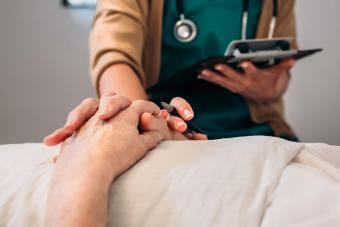
There are several dozen legitimate online grief support groups available to help people understand and cope with the loss of a loved one. However, for those quickly and unexpectedly thrown into the pit of grief, looking on the Internet for support is one of the hardest steps to take.
Find an Online Grief Support Group
Online grief support groups break into two categories: Those that offer support for a specific loss, such as the death of a child, or sites that give general information and assistance about all types of death and dying issues. Choosing the right one depends on what you are looking for in a group.
Specific Loss Support Groups
The following is a list of online support groups that deal with a particular loss:
- The MISS Foundation provides services to families who have experienced the death of a child at any age.
- The Compassionate Friends provides hope and understanding to those who have lost a child at any age due to any cause.
- Share Pregnancy and Infant Loss Support is a community for anyone in the family who has experienced the tragic loss of a baby.
- First Candle offers online support groups for those who have experienced loss by Sudden Infant Death Syndrome, stillbirth and miscarriage.
- SUDC Foundation offers resources and support for bereaved families who lost children due to sudden unexplained death.
- A Little Hope provides support services for children, teens and young adults who have experienced the loss of a parent, sibling, or a loved one.
- The Alcove offers support services for grieving children.
- Gold Star Family supports families who have lost a loved one during military service.
General Loss Support Groups
The following are websites that offer support for the loss of all loved ones:
- GriefNet provides online support to help people work through loss and grief issues of all kinds.
- GriefShare is a network of caring people who will walk alongside you through one of life's most difficult experiences so you will not have to grieve alone.
- Daily Strength enables you to share your experience and join a support group so you are able to connect with those on the same path.
- Grief In Common allows you to share the circumstances surrounding your loss by creating a profile and searching for those who you may have a connection.
About Online Bereavement Groups
Whatever stage of the bereavement process you are in, you can always seek online support. Many choose this style of therapy because grieving about their loved ones happens from the privacy of their own homes. Most of these groups are founded by those who have lost a loved one or who have done extensive research about bereavement support. Online support groups offer individuals:
- A chance to share their grief with others who went through the same situation.
- Information about memorials and funerals.
- A place to talk about their loved ones without feeling unwelcomed or uncomfortable.
- A safe place to post poetry, photographs, journals or articles about the person who died.
- The ability to remain anonymous.
- An opportunity to meet locals who can offer support; many times people who meet online and live in the same area often get together.
- A secure place to share joys, sorrows, and memories about the one who died.
- The chance to feel less lonely in your grief.
- A place to learn coping skills, stress management techniques and ways to relax.
- An all-around sounding board.
Beware of the Dangers of Grief Support Online
Just as there are dangers to online dating or social networking, there are risks to joining an online grief support. Visitors to these sites should heed the following warnings:
- Never give out personal information to anyone. This includes your full name, address, phone number, computer or online passwords, credit card or bank information or other identifying factors.
- Make sure the group you join is a secure private website. Registration should be required and approved.
- Legitimate groups will not ask for a registration fee; many will take donations since they are non-profit organizations, but it is not mandated.
- Do not believe everything you read. It's hard to believe that scam artists invade personal and emotional sites such as this, but they do.
- Report suspicious behaviors to the group's moderator or website owner
- Be careful what you post. If you are unsure about the website, don't post photographs of your loved one. It is very easy to steal someone's picture on the Internet.
Free Online Grief Counseling
You may be unsure if you need or want grief counseling or support after the loss of a loved one. If you are on the fence, you may want to check out a few free online resources to start:
- My Grief Angels is an online grief and bereavement support community. There are no donations, membership fees or mandatory sign up required.
- Grief Anonymous is available to everyone free of charge. The online support options are dedicated to assisting those grieving the loss of a loved one.
- Online Grief Support is a free social community available so you don't grieve alone. You set up a profile and utilize their many resources available on their website.
- Facebook is also another option, there are many pages dedicated to grief support.
Understanding Grief
The death of a loved one can render a person's ability to function normal, unable or unwilling to join a grief support group. Many newly bereaved persons are lucky if they can perform everyday activities such as:
- Getting out of bed in the morning
- Completing simple household duties
- Tending to personal hygiene
- Preparing and eating meals
- Sleeping on a normal schedule
- Going to school or work
Stages of Grief
You cannot put a time on how long you grieve. Some people take years to come to terms with the death of a loved one, while others only need a few weeks. How long someone grieves depends on the relationship they had with the deceased. Documentation supports that bereaved individuals go through five stages of grief before they truly begin to feel better. Those stages are:
- Denial: Deny not only the fact that the person died but also any responsibility surrounding the death.
- Anger: Claim that the death should not have happened; placing blame on why he or she died.
- Bargaining: Negotiating with others about the person who died.
- Depression: State of extreme sadness; cannot function in normal situations.
- Acceptance: Finally accepting the death and establishing a new normal life.
Learning to Live Your New Normal Life
Support groups, whether they are online or in-person do not and cannot resolve a person's grief. Nothing can do that, because in one way or another, that grief will always be present. However, the person who received the support can now learn to lead a new normal life, knowing that it's okay to be happy again.







